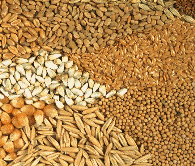 | « Back to article | Print this article |
 Critics have slammed a bloated subsidy that has been proposed for the food security bill, but officials in the government strongly believe that the resultant additional burden will not be above Rs 27,000 crore to meet the commitments under the proposed legislation.
Critics have slammed a bloated subsidy that has been proposed for the food security bill, but officials in the government strongly believe that the resultant additional burden will not be above Rs 27,000 crore to meet the commitments under the proposed legislation.
Even so, the exchequer will be left poorer by another Rs 58,275 crore owing to the additional planned expenditure for running various programmes as well as an increase in the annual expenditure for the agriculture ministry.
As such, actual expenditure of the union government in running the entire programme would be Rs 85,275 crore, part of which would also be shared with states.
Besides, this includes a lot of expenditure on ongoing social schemes like the Integrated Child Development Scheme (ICDS), which the central government already incurs as part of its planned expenditure.
Figures to the tune of over Rs 1 lakh-crore floated around in certain quarters are "only speculations" going by food ministry sources.
Food Minister K V Thomas says the official estimate pegs the net impact on the expenditure of food security bill at less than Rs 1,00,000 crore.
"This also includes the annual additional expenditure of the ministry and the subsidy component," he told Business Standard.
The national food security bill, as cleared by the union cabinet, seeks to provide legal entitlement for cheap grains to three-fourth of the country's rural population and half its urban dwellers.
For the priority category, the bill seeks to provide rice at Rs 3 per kg per month, wheat at Rs 2 per kg per month and coarse grains at Rs 1 per kg per month. Those in the general category will be assured grains at a price that will be half of their prevailing minimum support price (MSP).
Thus, the basic grudge against the food bill is that the centre's food subsidy will rise as and when the MSP is increased, as the sale price of grains has been fixed at Rs 3 (per kg for rice), Rs 2 (for wheat) and Rs 1 (coarse grains) for priority category, and 50 per cent of the MSP for the general category.
But, ministry officials say this is not the case. The price at which the grains are to be sold in the market will be an executive decision, claims a source.
"If the government feels that subsidy burden is going beyond the limit, the sale price can be raised," he notes. However, this decision will have to be informed to Parliament, since subsidy is proposed to be included in schedules of the food security bill.
The talk that agriculture ministry's annual budget will have to rise to Rs 1,00,000 against the current Rs 20,000 crore is "not accurate" as this amount will be spread over a period of five years, he notes.
"So, in effect, the impact annually of the expenditure for raising food production would be somewhere around Rs 22,120 crore," the official adds.
The government's annual food subsidy is between Rs 60,000 crore and Rs 62,000 crore. Besides, Rs 27,000 crore of subsidy burden, the annual cost of allowance to pregnant and lactating women is somewhere around Rs 14,150 crore.